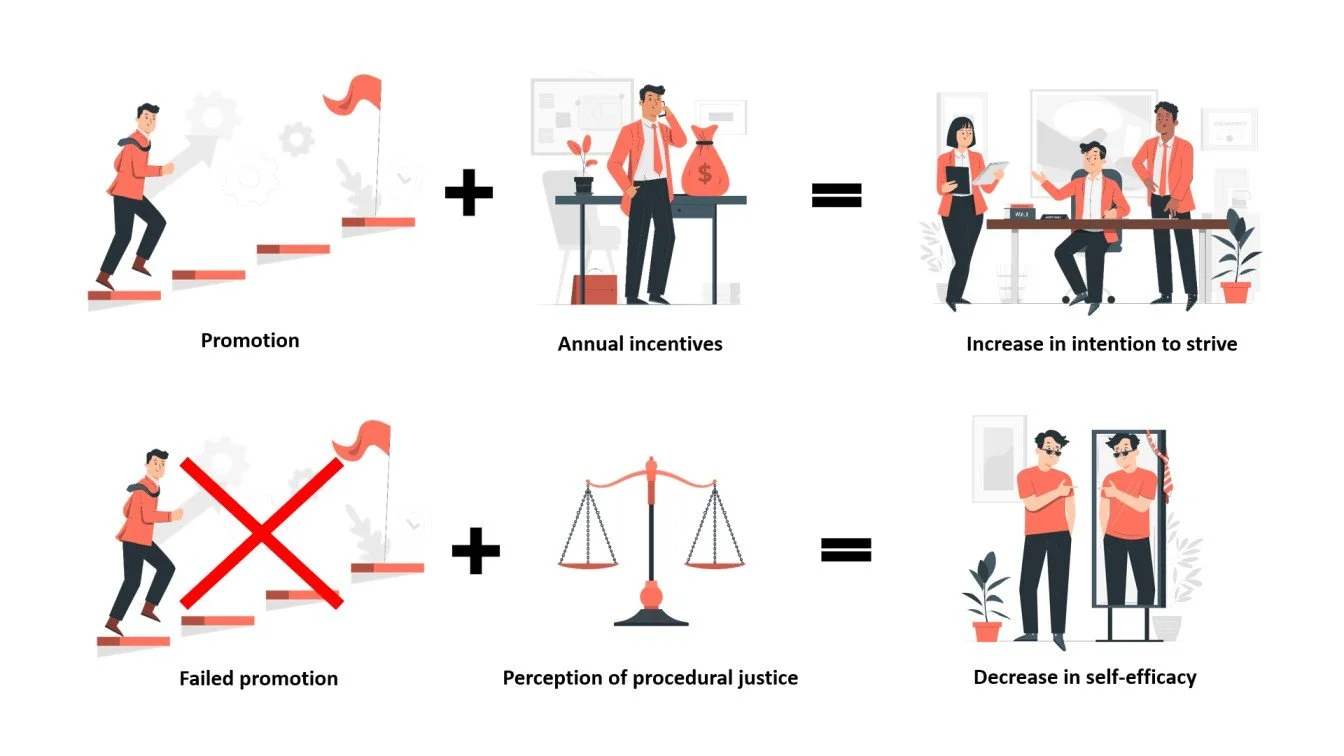Digest 43. The unintended consequences of promotions
Promotions typically appear as part of the last phase of a performance management cycle, which is the “reward” phase. Promotions can either be seen as “tangible” or “intangible” rewards. In many cases, they are “very” tangible when associated with pay increases (often due to the upward movement to a job that is at a higher salary level); they are also more concrete signs of appreciation than verbal praises and recognitions. On the other hand, promotions can be considered “intangible” rewards, linked to an employee’s career development, as opposed to financial incentives often distributed on an annual basis (see Digest 38 for different types). Promotions and incentives can also be differentiated from a psychological perspective of those who give and receive them. Incentives are the typical example of extrinsic motivation, and research supports their motivating effect; they also show a “sorting effect” (see Digest 38) by actually increasing the turnover of those individuals who do not perform well. Hence, incentives are not really an instrument for retention. To this end, promotions may be a more useful tool because they are part of the psychological contract, that is the unwritten and implicit contract (complementary to the legal one) an employee and an employer stipulate based on reciprocal promises and expectations. Indeed, promotions are often used by organizations to boost employee retention and employee engagement, but the questions are:
Do job promotions have a motivational effect? And do they have side-effects?
Two recent scientific studies have offered empirical bases to answer these questions.
In one study, Dutta and colleagues (2021) examined the effects of promotions and incentives on individuals’ attitudes in the workplace. They surveyed over 700 employees of a multinational company in India specialized in energy storage and management, and examined how their job satisfaction, intention to stay with the organization (as opposed to turn-over) and intention to strive (an indicator of their motivation at work) changed after receiving a promotion and/or annual financial incentives for their performance.
They found that promotions and end-of-year financial incentives were associated to each other only moderately, meaning that they do not always occur together. Furthermore, they have different effects on individual attitudes when offered in combination. Job satisfaction and intention to stay increase when receiving a promotion, regardless of whether an annual incentive is received or not. On the other hand, the way intention to strive (that is, the motivation to persist and put in significant effort in one’s job activities) is influenced by a promotion depends on tangible rewards. When promotions are offered together with annual incentives, the intention to strive increases; conversely, when promotions are offered in isolation from annual incentives, intentions to strive decreases. In interpreting these findings, it is also important to note that there may be a gender confound, because over 90% of the respondents in this study were men.
In a second study, Zhu and colleagues (2022) explored the “de-motivating” effect of failed promotions: that is, whether people reduce their work engagement once they fail to be promoted. The authors conducted three different studies in China (namely, two survey-based studies across organizations and industries, and an experimental scenario-based study) to enhance the trustworthiness of their findings.
All three studies showed that promotion failure brought about a decrease in work engagement via two mechanisms: (1) an emotional one whereby people felt greater anger; and (2) a cognitive one whereby people started to doubt their abilities and decreased their perceived self-efficacy. The experimental study added another interesting element to the picture by revealing that those effects are -respectively- mitigated or exacerbated by the perceived fairness of the promotion procedure. When this is considered fair, people experience less anger probably because they can make better sense of why and how the decisions were made. On the other hand, a promotion procedure that is considered fair has a further debilitating impact on one’s perceived self-efficacy. While people may tend to attribute their failures to external events or agents, it becomes more difficult to activate these defense mechanisms when the procedures are well designed and implemented (and so, seen as fair).
Organizational implications
Just as any other tool, particularly in the reward management and compensation domains, promotions are not a panacea, and the following points should be considered by organizations:
Promotions are mostly effective at increasing job satisfaction and retention. To exert a motivational effect, and hence improve the level of effort that employees invest in their work, promotions need to be accompanied by financial incentives. Put differently, rewarding an employee with greater status and a higher job title will make them feel appreciated and willing to remain with the company, but will not motivate them to work unless combined with a monetary reward.
Promotion procedures should be designed and implemented fairly and should be communicated clearly to the employees who go through the promotion process. This will reduce anger reactions after a failure.
Promotions can be highly demotivating for those who fail at achieving them. To prevent a boomerang effect on the motivation and performance of talented individuals (because people considered for promotions are certainly high-performers) it is important to offer them support systems such as coaching programs. Such programs are important both before the promotion procedure (to prepare them at best for being selected for the higher positions) and after (to design tailor-made challenges to restore their work self-efficacy).
——
References:
Dutta, D., Kumar, K. K., & Mishra, S. K. (2021). Unintended consequences of promotions: Importance of annual incentives for performance management systems. Human Resource Management, 60, 787-801. https://doi.org/10.1002/hrm.22062
Zhu, Z., Chen, X., Wang, Q., Jiao, C., & Yang, M. (2022). Is shooting for fairness always beneficial? The influence of promotion fairness on employees' cognitive and emotional reactions to promotion failure. Human Resource Management, 61, 643-661. https://doi.org/10.1002/hrm.22110

